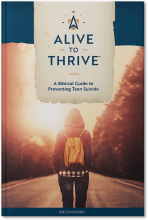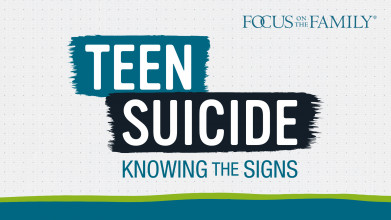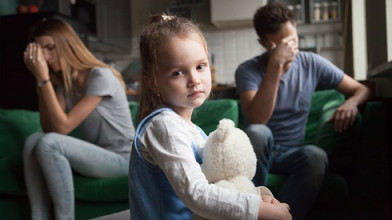
Homemade Meals for Busy Families
Mary Beth Lagerborg, co-creator of Once-A-Month-Cooking, discusses the importance of hospitality and how families can prioritize dinner time by cooking a month’s worth of healthy meals in one session.
Rescue 2x the babies from abortion!
Home » Episodes » Focus on the Family Broadcast » Understanding Teen Depression and Suicide (Part 1 of 2)
John Fuller: Well, here’s a woman describing what depression felt like when she was a teenager.
Quote:
Unidentified Woman: It was just overwhelming. I felt like it was hard to get out of bed in the morning. I felt like I didn’t have what it took inside of me to do life. I felt like I just didn’t have what it took because I was so overwhelmed by that darkness. I didn’t feel sad all the time. I just was completely discouraged. It was hard for me to see my future.
End of Quote
John: Hmm, well, you’re going to be hearing more about teen depression today on Focus on the Family, and what you can do about it. I’m John Fuller. And your host is Focus president and author Jim Daly.
Jim Daly: John, depression suicide rates among kids is staggering. The numbers are just going off the charts. And we, as parents, should all be alarmed and concerned – everyone should be alarmed and concerned. According to the Department of Health and Human Services, more than 3 million adolescents – that’s ages, 12 to 17 – reported at least one major depressive episode in the past year, and more than 2 million reported severe depression that impeded their daily functioning, just like what we heard from that young lady there.
Here at Focus on the Family, we wanna be here for you, and we want to be, here for you in every aspect of your parenting. And today, we want to come alongside you and help you understand the difference between normal teen behavior and when you should have cause for concern. And most importantly, to help you and equip you to understand the warning signs of depression in your teen.
John: Yeah, and we have resources and hope for you here at Focus on the Family. And, we’ll invite you to stop by focusonthefamily.com/radio, or give us a call. And our guest today is Dr. Gregory Jantz. He’s a psychologist and the author of dozens of books, including, The Stranger in Your House, which is the subject of today’s conversation.
Jim: Dr. Jantz, welcome back to Focus on the Family.
Dr. Greg Jantz: Oh, very good to be with you. What an important topic we have.
Jim: Oh, it’s so true. And, you know, just here in Colorado Springs, we have had an escalation of teen suicide that is, um, breathtaking…
Greg: Yes.
Jim: Two of the schools not far from – from Focus on the Family, here, have had 12 suicides in the last two – three years.
Greg: It’s more common than you ever would imagine.
Jim: What is happening, Gregory? What – what is going on in the psyche of the teenagers today? – some Christians – these are Christian homes that are impacted as well. What is going on that gives them such hopelessness?
Greg: We’re living in a time and a culture with our kids that it’s hard for us to imagine the pressures that they may be feeling. There’s the pressure of, I have to be a certain way. The big question – where do I fit in? I’ve got the pressure of technology, social media. So there’s a lot that’s running in the background for kids these days that we may not fully understand just the level of pressure that that’s creating. A lot of our kids right now, if you ask them about the future, there’s a general sense of just – they’re apathetic. It’s like, if I look at the future, it doesn’t look that great. And, uh, they’re also seeing parents who are struggling with depression. So we have a lot of issues out there that our kids are – are seeing, and they’re carrying a very heavy weight we’re not always aware of.
Jim: Yeah, you know, the faith component to this, along with your background in psychology…
Greg: Yes.
Jim: …As a psychologist, in many ways, it must startle you. It must concern you. But even beyond that, you’re a dad of two teenagers.
Greg: I am.
Jim: So that practical experience of what they’re going through, what their friends are going through, um. Do you have any description, in that regard? What do you see firsthand as a parent, like the rest of us?
Greg: Sure, sure. Well, we need to also – and we love our kids dearly, don’t we?
Jim: Yeah, absolutely.
Greg: And we wanna – we want to be able to reach into their lives and understand what’s goin’ on. So a teenager, though, they’re going through a lot of changes.
Jim: They are.
Greg: There’s a shedding of the skin.
Jim: It’s true.
Greg: Maybe, you know, it’s like, OK, I thought I knew her. I thought I knew him. And all of a sudden, there’s this change. And you go, who is this? Who is living in my house? I don’t know you anymore. And so there’s a natural, uh, transformation – shall we call it? – and sometimes it’s awkward. Sometimes it’s like, oh, no, I don’t even know how to relate to my kid anymore. So I’m going to call all that pretty normal.
Jim: Yeah.
Greg: That’s normal.
Jim: And that is. What – as a parent, what are some of those things that differentiate between normal, and now I’m a little worried?
Greg: Yes. And that’s what we need to look at.
Jim: Yeah.
Greg:So a teen may go through – there’s the moodiness, there’s an awkwardness. You know, the big question is, who am I, and where do I fit in? So, but when you begin to see that suddenly their social circle has changed – it’s the kid who has the ear buds in their ear and they’re never taking ‘em out. It’s like they’re disconnecting. You’re seeing them disconnect from a peer group. You may see them disconnect from the family. And you know something’s going on, but it’s like you can’t reach them. If it’s a young man, you may say, hey, what’s going on? How are you? And it’s one-word answer. Fine.
Jim: Yeah.
Greg: You know, it’s like, how do I reach him or her? If you notice that, um, they’re withdrawing more and more – now there’s sometimes this can be normal, they’re working through some things – but we’re talking three months have passed, uh, maybe academically, we see some concerns, they’re not wanting to do the normal things they were doing – be with the friends. Uh, you don’t see them, their routines have changed, and they maybe they want to hide out in – in their room. You see a constant negativity. So we’re looking for a pattern that is lasting over a period of time. And we also may really need to listen to the words they’re using. They may be using fewer words, but, um, kids give us some clues.
Jim: Yeah.
Greg: Um, you know, like, nobody likes me. Or, um, they may say things that, uh, surprise you. Um, nobody cares about me, and – and things that normally you didn’t hear them say.
Jim: Now some of that can be very, eh, normal. I remember being a 7-year-old, and I was depressed ‘cause my older brothers and sisters, uh, seemed to get all the fun, and they got all the permission to do fun things…
Greg: Right.
Jim: …And, you know, I’m way later born than they were – six years to my closest sibling – but I remember one time going – (laughter) and this is actually silly – but just saying, I’m gonna kill myself because nobody here loves me.
Greg: Right.
Jim: And there’s a difference between kind of just isolation, and then real depression. I mean, looking back on that, I was just a child who was lonely.
Greg: But looking for attention.
Jim: Looking for attention more, especially with my extroversion – it’s like, nobody’s paying attention to me (laughter).
Greg: Yes.
Jim: And that bugs me.Em, for that parent, how do you discern adequately between, OK, this is just – he’s feeling isolated versus, uh, oh, we better take him to a psychologist?
Greg: Sure. If you’re not able to have time where they’re able to tell you what’s goin’ on. And, you know, it could be a kid may feel betrayal – my friends have rejected me. Particularly, um, for boys, they’re going to handle this differently, generally. But a sense of betrayal – I feel rejected. And you may see some real aggressive behavior. You may see them really withdraw. Um, we may see a time of a lot of tears. But as we look at what – if we cannot connect with them, and, you know, here’s what I’m gonna suggest. Don’t just go into their room and say, take those ear buds out of your ears, and let’s talk. That’s probably not gonna work.
Jim: That drives him, probably, to more silence.
Greg: Right. But, if you can find a way, to engage in some activity with him, and I think sometimes as simple as, hey, let’s go out for just a little walk. I – I want to have some time with you.
Jim: Yeah.
Greg: And began to hear their heart. What’s going on? How were they hurt? You see a kid who gets hurt repeatedly – rejections, betrayal. They may not know even how to process that, or what’s goin’ on? How do I even put that into words? You’ve probably noticed, by the way, your boys may be a little slower to put, feelings into words.
Jim: Yes.
Greg: Generally speaking. But help them. We’ve got to find a way to connect with them. Be with them physically. Now, if you’re just seeing ongoing deterioration, we really do need to step in and intervene. And I think there’s a place where we’ve got to get some help to our kids. We don’t wanna wait too long.
Jim: Yeah, and that’s a good point. I mean, again, in my little illustration, by the next day, I was fine. I was back to normal and having fun. It was just that one day, I really had a funky feeling about where I was at – kind of what you’re saying. As a parent, you have to be aware of, OK, this just a momentary thing. Don’t freak out.
Greg: Yes, right.
Jim: Don’t panic. Um, and then when it’s prolonged, that lack of resilience is an issue.
Greg: Right, it is. Lack of resilience, they’re not coming back. So let’s also not – I call it freak out. Your kid has a bad day and you’re goin’, oh, no, what’s going on? Um, no. They’re gonna have those. And they need to learn how to emotionally deal with tough days.
Jim: Yeah.
Greg: And they need to process – we need to allow them the space to do that. And part of this is growing up. But when we come to a place where they’re not responding, and the darkness – that cloud is growing darker, um – one thing I hear from parents is, I wish we wouldn’t have waited so long. I wish we would have done somethin’ sooner.
John: Yeah. This is Focus on the Family. Dr. Greg Jantz is our guest today. And as a parent, Dr. Jantz, you’ve got a couple of boys. Have you had those moments where you’ve had to say, OK, this is normal? Or I wonder if…
Greg: Yes, I have. These – I’ve walked this, and I’ve had these- transformational times and transitions. Some of these are just natural transitions. You know, they’re got one foot in adulthood, one foot in teenagehood and it’s like, they’re trying to figure out – where do I fit in? And sometimes growing up can seem a little scary, too. I have a boy entering college, and we’re talk – we’ve been talking all summer about, uh, just the transition.
Jim: Oh, going onto a campus alone and trying to figure out where I fit in.
Greg: Yeah. Where do I fit in?
Jim: What club do I go to?
Greg: So – and we can really help our kids walk through these transitions. But we need to also know, if we see issues, and they have disengaged – and disengaged from a social group, disengaged from church or youth group, and we continue to watch them disengage – something’s going on that needs attention.
Jim: Yeah, Dr. Jantz, I want to ask you about the technology issue…
Greg: Yes.
Jim: …Because you described that a moment ago.And, uh, just at church on Sunday, I said, you know, we take a two – three minutes to introduce ourselves to those around us. And there was a family – it appeared to me that is probably the first time they’d come to the church, and there are three or four teenagers in the family. And I said hello to each one of them…
Greg: Right, right.
Jim: …Made sure I got their name.
Greg: Yes.
Jim: And one had buds in her ears. And I remember I got to her, I extended my hand to her, and she kinda quickly took the buds out. And she was, you know, very good about greeting me. But the question for me is, are we, with technology use – it’s not the technology, it’s a neutral thing, but the over-use, the lack of boundaries on that, to be listening to buds in a church service, to me, seemed odd…
Greg: Yes.
Jim: But – but how do we, as parents, approach our kids, especially us Christians, to say, you know, you shouldn’t overindulge in this because it’s creating a framework that allows you to go into a hole that, I think, depression can feed on?
Greg: Oh, absolutely. And we need to talk about – there’s an underground world in, uh, the cyberworld for our youth. Now I say underground is – is things are happening that we are not aware of. It used to be worried about – a little bit about text messaging. Now, it’s all the different social media. Kids run – I call it in herds, you know? What’s – what’s popular today. There’s a new app, you know, that everybody’s running to. So they run in herds, and we need to understand that the kids are dealing with cyberbully behavior.
Jim: Right.
Greg: And some things that we need to know – it’s going on. There’s – there’s, you know, tragic issues of people being bullied – cyberbullying. Um, there’s a slang right now with kids, uh, in this arena. They’re saying, ah, just kill yourself. Ah, just kill yourself.
Jim: Right, like it’s a throwaway line.
Greg: Like it’s – it’s like a tag line, uh.
Jim: Yeah. Well, and there was that recent case where that girl was convicted for not…
Greg: Yes.
Jim: …You know, not doing something to help, her boy friend, not kill himself. And I thought that was chilling that she was egging him on, supposedly.
Greg: Right.
Jim: And then, you know, the courts found that that is playing a role in him making that decision to kill himself. Every teenager, every parent should talk about that with their teens to say, hey, never encourage somebody to take their own life. And never stand by. I mean, do what you can do to help. And we in the Christian community should be at the forefront of that, helping people hold on to life.
Greg: Yes, Jim. You’re right.
Jim: Let me, ask you – in the book, you encourage parents to pause, close their eyes and think about their teen.
Greg: Yeah, OK.
Jim: This one really caught my attention, because I thought it was kind of a very clarifying comment.
Greg: Yeah.
Jim: Why is that image so important? And what are the images that parents you counsel with, what do they say when you have them close their eyes and think of their teenager? What do they say?
Greg: Well, we need – this is a good test because if we’ve got an image of – that’s negative towards our kid, and our image in our mind is that he or she is so troubled, and you – you’ve got a lot of anxiety around this image, that’s not helping. I want you to go back to the positive places, the memories, the things that you know that your son and daughter are gifted in. I want you to have a positive image and, importantly, of their future. They may really be struggling now, but God has a future for ‘em, and we need to be a part of being a positive image for their future.
Jim: You know, you say that. I had never thought about it in this context, but when Jesus was walking the earth and encountering so many human beings that were broken…
Greg: Yes.
Jim: And I’m sure had depression, even back then, without modernity. But Jesus is the epitome of saying, there’s hope. I mean, he must have seen what the woman caught in adultery could be.
Greg: Yes.
Jim: He could see the woman at the well and what she could become. He could look at the Apostles – the fishermen, right? – and call out to Peter because he knew what he could become.
Greg: Yes.
Jim: That’s, in some way, what you’re saying as a parent.
John: It is.
Jim: You need to look and have hope for your child.
Greg:God has a plan. Even though the struggle is real, there is a plan. And many of these teenage struggles will be used for good. And you can, through this, deepen your relationship with your kids. Hang in there with him.
John: OK, so I – I just dropped my teen off…
Greg: Yes.
John: …At some event, and we had a big fight, and I can’t get to that positive image. What’s something practical I can do?
Jim: So you see the fist shaking.
Greg: Yes.
John: It just – it ended pretty poorly in that negative – it’s – it’s a stinky image, OK? How do I get to the positive, Dr. Jantz?
Greg: Well, and it’s easy when – when things aren’t going well and you have a negative event, then we’ll start thinking about it, you know, and – and he never does this, and he always argues, and you start focusing on the negative. OK, I want you to find a way, though. Maybe it was a little rough ending, but I want us to find a way to reconnect, with – and it maybe the next day, but you’re going to work on, OK, I’m going to find a way to reconnect and speak some positive words into my daughter or my son’s life because God has a plan for them. Yes, there’s some rough edges right now. I get that. And, remember, they’re testing. They’re testing boundaries. They’re going to be testing in words they use. They’re testing. They’re growing. They are expanding. And some of it’s gonna be a little messy sometimes. Don’t over-personalize it. One of the things that we do as a parent is, oh, I failed! What have I done wrong? You know, I failed. I’m not a good parent. And we start to get negative on ourselves. Keep equipping yourself. A lot of great resources to equip yourself. But let’s not get self-absorbed that, oh, this is all my problem, and if we would’ve only done this or that – it’s easy to go to the past, and we’re going to go to the future here.
Jim: Well, and for parents who are struggling, you’re speaking right to them, Dr. Jantz. And I would say call us here at Focus on the Family.
Greg: Yes.
Jim: Let our counselling team help you and give you some perspective. I think that’s one of the best resources available to people.
John: Yeah, our number is 800-A-FAMILY, 800-232-6459.
Jim: Dr. Jantz, the role for me, right now, with two teen boys, is trying to keep them buoyant in their environments. And that may be over-parenting, and I’m wide open to correction.
Greg: Yes, OK.
Jim: But – but, you know, there’s certain things I want them to feel good about, even though they may have issues. Uh, maybe their appearance isn’t quite what it could be. Uh, maybe they’re not washing their face or brushing their teeth (laughter) as often as they could be.
Greg: Exactly. And you go, hmm, you’re 17 now, how come you’re not doing these things?
Jim: So the – the point of all that, though, is how much undergirding can we do that’s realistic? And how much becomes that helicopter parent – that you’re actually enabling them in creating a reliant person, not a self-reliant person?
Greg: Right. And we do need to be careful about over-rescuing, but there are some fundamental expectations that are OK. Um, as we grow up, we do brush our teeth, and we do shampoo our hair, and there’s some fundamental self-care that we need to be sure that they are doing. By the way, a depressed teen will stop all that self-care.
Jim: Oh.
Greg: You’re going to see, again, they’re not taking care of themselves. It doesn’t matter anymore. They haven’t showered for three days. And you’re gonna begin to see some of those are signs. You can also see a lot happening in sleep. Either they want to sleep all the time, or they’re not sleeping at all.
Jim: OK, so for parents of teen boys – you just panicked all of us. Because many teen boys, especially 13, 14…
Greg: Right.
Jim: They’re exhibiting that behavior, but they’re still in the normal zone.
Greg: Oh, they are.
Jim: Can you differentiate for us? That…
Greg: OK, yeah. Yeah.
Jim: I mean, when they’re stuck there, and their hygiene isn’t that critical – so many parents are saying, that’s my son.
Greg: Right, right. Yes.
Jim: That doesn’t necessarily mean they’re on a depression streak.
Greg: No. It doesn’t.
Jim: It can mean that.
Greg: So particularly what we’re looking for, though, is a person that has had some sudden changes, and this may be one of them.
Jim: Right, OK. Dr. Jantz, we’re gonna continue to dive into this and, we’ll get into it more next time. But let’s tip now toward more of the depression and the suicide. In your book, warning signs – and you’ve touched on some of them, but I want to succinctly mention them here. Self-injury, smoking, shoplifting, anxiety, eating disorders, drinking, you know, alcoholic beverages, drugs as a teenager, or maybe even a preteen – these are certainly signs that you’ve got issues, and you’ve got trouble.
Greg: Right.
Jim: For those parents that are hearing that, and they don’t know what to do, what’s one of the first things they can do?
Greg: One of the first things I want you to do is just be with your son or daughter. When I say be with, um, that may mean, I’m gonna engage, probably, in an activity. We’re going to do something together, even if it means we’re going to go out. Have dinner together, a physical activity – I’m gonna go – we’re gonna go for a hike, but engage in something outside of the home, and give an opportunity for them to process. Now, they may struggle putting it really in words. There’s something called teenage shame. They may feel really shameful. They did something or something was said to them, and they were really injured by it and they feel a lot of shame, and they feel like, I’m not good enough or I’m defective. Kids don’t like me. They may feel that rejection. So I’m gonna suggest, without a lot of pushing, you do more – more listening, even though there may be some long silences, but do more listening than pushing. But engage them in an activity. Now, that’s the first thing. Be with them.
Jim: Right. Well and – and what’s beautiful about that is, again, I think that’s the Lord’s heart – what you’re expressing. I mean, he didn’t shame sinners.
Greg: Right.
Jim: He came alongside them, encouraged them, forgave them, and asked them to do better.
Greg: Yeah.
Jim: And I think with parenting, that’s another great example. Talk about, though, further, the power of shame. Because I think a lot of parents – I think we particularly, as Christian parents, we can root our parenting in shame. And we don’t know the damage that we’re doing. And, you know, personally, I just think shaming is perhaps the stick of dynamite…
Greg: Sure.
Jim: …In your relationship. There’s nothing more detrimental and more damaging than shaming your child because they’re not meeting perfection.
Greg: Yes. And we may not be aware that we’re doing it, too.
Jim: We think we’re doing the right thing.
Greg: Yes.
Jim: Straightening him out.
Greg: Sure.
Jim: And they’re feeling inadequate, unable.
Greg: Right. Now, Jim, they’re going to be hypersensitive to judgments, hypersensitive to what feels like being critical. And so you’re gonna easily offend a teenager sometimes.
Jim: What does that sound like? Before we get more definition, what does shaming sound like?
Greg: Well, why didn’t you – and whatever, fill in the blank.
Jim: Are you never?
Greg: Right. So – so there’s a tone, but also, there’s a judgment that comes across. Yeah, it’s kind of like, why don’t you just grow up, you know? Well – well, he is growing up. But those are not helpful comments – that really are judgments.
Jim: Yeah, and so much of your relationship with your children will be defined in that moment, you know? And, uh, you better be prepared ahead of time, especially, again, the Christian households where, you know, it may be your child looked at pornography, and how are you going to handle that? Think about it before you encounter it so that you can handle it well.
Greg: Yes. And we want to handle it well because we want to maintain a relationship with our kids. So maintain the relationship. They may have done something that you’re so embarrassed about, you may be concerned about, even in the community, or they embarrassed our family. You know, you can begin to be really concerned. And it’s easy to, um, say things that you’re gonna later regret.
Jim: Let’s look at, uh, depression very specifically. We’re going to come back next time and spend most of the time talking about depression/suicide. But in your book, you define three characteristics of depression. What are they?
Greg: So one of the characteristics of the depression is it doesn’t go away.
Jim: This is persistent.
Greg: It’s persistent. OK, so this is not just a mood. Uh, my kid is persisting in this mode, and it’s not going away. Another characteristic of depression is, my kid is not doing the normal, fundamental self-care and the basics. Now, I know that sometimes is challenging, but they have withdrawn from, really, reality, or they’re trying to create another reality online.
Jim: Escape.
Greg: An escape. So that you may see a lot of escapism behaviors. You may see some, um, drug experimentation. Obviously, there’s pornography issues to be addressed. You may see a social group changing, we may be at a place with depression and teens that they’re speaking – and one of the characteristics is they can feel a lot of despair. I feel…
Jim: Yes.
Greg: …Despair. They feel hopeless. And for you, it may – it’s like, you know, a friend – I felt rejected. For you that’s maybe not be a real big deal. For them it is a real big deal.
Jim: Wow. Greg, this is so good. And I know parents are being helped. I mean, hopefully, we’re being very practical here with all of our comments.
Greg: That’s our desire.
Jim: That is our goal. And again, if you need help, get in touch with Focus on the Family. In fact, we’d love to make this, uh, book by Dr. Jantz available to you,When Your Teenager Becomes The Stranger In Your House. And again, if you cannot afford it, call us. We will get it into your hands somehow because the power of the message is so strong and so good. And, if you can give us a donation for any amount, we’ll send that your way to say, thank you. If you’re in a position to help Focus provide that resource for others who can’t afford it, we would deeply, deeply appreciate it. So let’s do ministry together. Let’s become better parents in the Christian community. And if you’re not a Christian, I hope this makes sense to you. Why not stand up for your children and do the right thing, be active in your parenting, learn how to parent in a more, productive way. And, Dr. Jantz, when we come back next time, I’ve got a lot more questions for you.
Greg: Let’s do it.
John: OK. And we should note, as well, Jim made mention of it earlier. We have counselors here at Focus on the Family. And it may be that we’ve touched on something that you’re saying, that’s me, but I have no clue where to turn. I can’t wait to get the book. I need to have an answer now. Give us a call, or use our online find a counselor tool. Uh, our number is 800-A-FAMILY, 800-232-6459. And our counselors can have a free consultation with you, an initial conversation to kind of point you in the right direction and get you started on the road to healing and, uh, some help for your family. Also, find Dr. Jantz’s book,When Your Teenager Becomes The Stranger In Your House. Make a donation, get a CD or download of this program at focusonthefamily.com/radio.
Jim: Dr. Jantz, as we close, I’m thinking of the parent listening who’s going, I have blown it. I have done all the shaming. I have, in order to correct the behavior, I’ve burst into the room. I’ve told them to take those buds out of their ears and get off their technology. And things are going to be different now, so go take out the trash and wash the car and get ready for church ‘cause we’re leaving in 30 minutes. And, speak hope into that parent. What should they do differently? And what can they do today – tonight that speaks life into their teenager?
Greg: One of the things you can do is say, I love you so much, and I am sorry. I really reacted, and I’m sorry about some things I said. Will you please forgive me? Build a bridge of forgiveness. Parents make mistakes, and we say some things – go, oh, why – how did I ever say that? So you can build a bridge with forgiveness.
Jim: Hmm. That’s well said.
John: And, uh, as Mom and Dad, you own that responsibility to pursue that relationship. I hope you’ve been encouraged by our conversation with Dr. Greg Jantz, and that you’ll join us again next time as we once again help you and your family thrive in Christ.

Gregory Jantz , Ph.D., is a state-certified chemical dependency counselor, a licensed mental health counselor, and a nationally certified eating disorder specialist. He is an internationally recognized expert on a wide range of afflictions including anxiety, depression, abuse, and addiction, and a go-to media source expert on these topics who’s been interviewed by major outlets like CNN, FOX, ABC, CBS, and many more. Dr. Jantz is the founder of The Center • A Place of HOPE which is regarded as one of the nation’s top 10 best facilities for the treatment of depression. He is the best-selling author of nearly 40 books including Five Keys to Raising Boys, Don’t Call It Love, and his latest, Healing Depression for Life. He and his wife, LaFon, have two sons. Learn more about Dr. Jantz by visiting his website, drgregoryjantz.com.

Receive Dr. Gregory Jantz's book The Stranger in Your House for your donation of any amount!

Teen suicide is a serious and troubling problem facing our country. Suicide is the third leading cause of death among teens in America. But God’s Word offers hope and healing, especially for a generation desperately seeking purpose.

Visit our online store and purchase a CD of today's program for yourself or to share with a friend.

How should I handle my adolescent's emotional instability? In particular, how can I tell the difference between 'normal' teenage moodiness and serious clinical depression?

A new podcast series helping you distinguish normal teen behavior from serious problems like depression and suicidal thoughts. Tune in to hear expert advice and insightful stories from people who have overcome teen depression.

A child or teen suicide attempt represents much more than a medical problem. It represents a young person in crisis, crying out for help.

How does a parent recover and move on from the tragedy of their child committing suicide?

How do we stand with our teens through this adolescent season of change and emotional upheaval?

Make each day count with your kids. Every action you take can contribute to your child's mental health.

Please let us know what you think about our broadcast! To help us provide the best possible programming for you, we need your honest feedback on how we're doing and how we can get better.

Mary Beth Lagerborg, co-creator of Once-A-Month-Cooking, discusses the importance of hospitality and how families can prioritize dinner time by cooking a month’s worth of healthy meals in one session.

Scott Klusendorf, President of The Life Training Institute and Robyn Chambers, Vice President of Advocacy for Children at Focus on the Family, share strategies and encouragement in the pro-life movement. They offer compassion for abortion-minded women and speak up for pre-born babies. (Part 2 of 2)

Scott Klusendorf, President of The Life Training Institute and Robyn Chambers, Vice President of Advocacy for Children at Focus on the Family, share strategies and encouragement in the pro-life movement. They offer compassion for abortion-minded women and speak up for pre-born babies. (Part 1 of 2)

Larnelle Harris shares stories about how God redeemed the dysfunctional past of his parents, the many African-American teachers who sacrificed their time and energy to give young men like himself a better future, and how his faithfulness to godly principles gave him greater opportunities and career success than anything else.

Amy Carroll shares how her perfectionism led to her being discontent in her marriage for over a decade, how she learned to find value in who Christ is, not in what she does, and practical ways everyone can accept the messiness of marriage and of life.

Psychologist Dr. Kelly Flanagan discusses the origins of shame, the search for self-worth in all the wrong places, and the importance of extending grace to ourselves. He also explains how parents can help their kids find their own sense of self-worth, belonging and purpose.